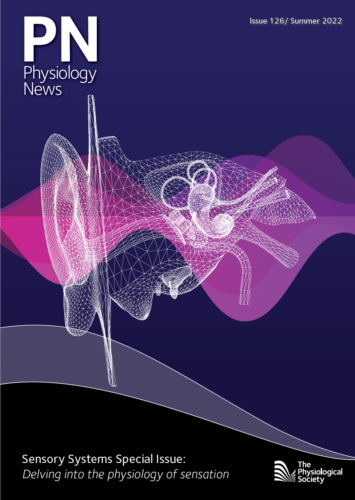
Physiology News Magazine
We must talk!
News and Views
We must talk!
News and Views

https://doi.org/10.36866/pn.126.8
Dr Peter Kohl
Editor-in-Chief, The Journal of Physiology
Physiology News (PN) welcomes the new Editor-in-Chief of The Journal of Physiology, Dr Peter Kohl, who started his tenure in April of this year. Peter studied Medicine and Biophysics in Moscow, did his PhD in Physiology at the Berlin Charité, spent 20 years researching cardiac mechano-electric feedback at Oxford, and another five years focused on heterocellular interactions at Imperial College London, before setting up the new Institute for Experimental Cardiovascular Medicine at Freiburg, Germany. He will have a regular column in PN, and hopes to engage our readership to join a discourse about physiology in general, and publishing physiology-based research in particular.
The phrase ‘we must talk’ triggers the startle reflex in me, running a quick mental check to probe potential recent transgressions. If that is the same for you – please excuse me: this is not what I intended.
But: I do think we need to talk.
If you read PN, most likely you will be a member of The Physiological Society. And – so at least I hope – you are an admirer of The Journal of Physiology (JP). Of course, you should be, since you – as a member of The Society – ‘own’ JP.
Though – ownership obliges!
As a Society, we derive significant benefit from JP, in domains including science, reputation, and finance. Income from JP is crucial for enabling The Society’s activities, upholding research and education in physiology for public benefit.
Like most journals, there will be increasing pressure on JP to consider switching to Open Access (OA). And while OA solves some problems (such as offering free access to papers for all) – it generates new ones (such as shifting costs to authors). One problem often overlooked is that Society-owned journals do not operate to generate profit, but resources for academic independence and self-organisation. If we wished to maintain the current levels of charitable income for The Society, yet switch to OA, JP would have to charge ‘article processing fees’ to authors that approximate those commanded by Nature.
Leaving aside the question of whether this would be desirable in general, or affordable in particular, it would not be viable. Few journals have the global impact of Nature, and the benefits of having a JP publication on an individual’s CV – rightly or wrongly – will not match the prestige of a Nature paper. So when choosing where to submit what, the balance of journal-level metrics such as the impact factor (50 for Nature, 5 for JP) versus fees associated with publishing will affect author decisions.
Now, we all know that metrics can be surprisingly poor indicators of the actual standing of a journal in a field. And they are even less indicative of the quality of an individual paper (1). In any case, metadata reflect at least some aspects of the status quo. One of these aspects is the fact that, in spite of tremendous efforts, JP has seen a continued reduction in the number of original papers submitted over the last few years. Also, just 16.5% of current Society members (postgraduate and above) have submitted original research to JP since the start of 2019.
This is equivalent to one paper submitted per member of The Society every 20 years… So, this is what we need to talk about. For JP to continue to flourish, and to be able to support the good work of The Society, we as members must take more conscious and more complete ownership of JP. First and foremost, this means that we submit our best work to JP.
If that may not be possible, then at least we should be aware of, acknowledge and share the amazing research published in JP.
Now we all know how difficult it is to deal with information overload: it is easy to miss relevant papers. JP therefore proposes to set up a “Readers Digest” service for members of The Society, which would inform you – just once every 12 months – of the most exciting JP papers in your area, published in the preceding calendar year. If this allowed members of The Society to discover just one additional recent JP paper relevant to their studies, and to consequently cite it, it would accelerate the transfer of knowledge in our field, improve journal visibility, and benefit the metrics that researchers evaluate when choosing where to publish.
I hope that this may be of interest to you. In any case – please let me know your thoughts and suggestions on where you see the future of JP, on how you would wish to exercise your ownership of the journal, or on any other aspect of the interrelations between The Society and The Journal – by writing to me via pkohl@physoc.org. I may not be able to respond to each message directly, but I would hope to sum up and address key points in future editions of this column here in Physiology News.
So let’s talk.
